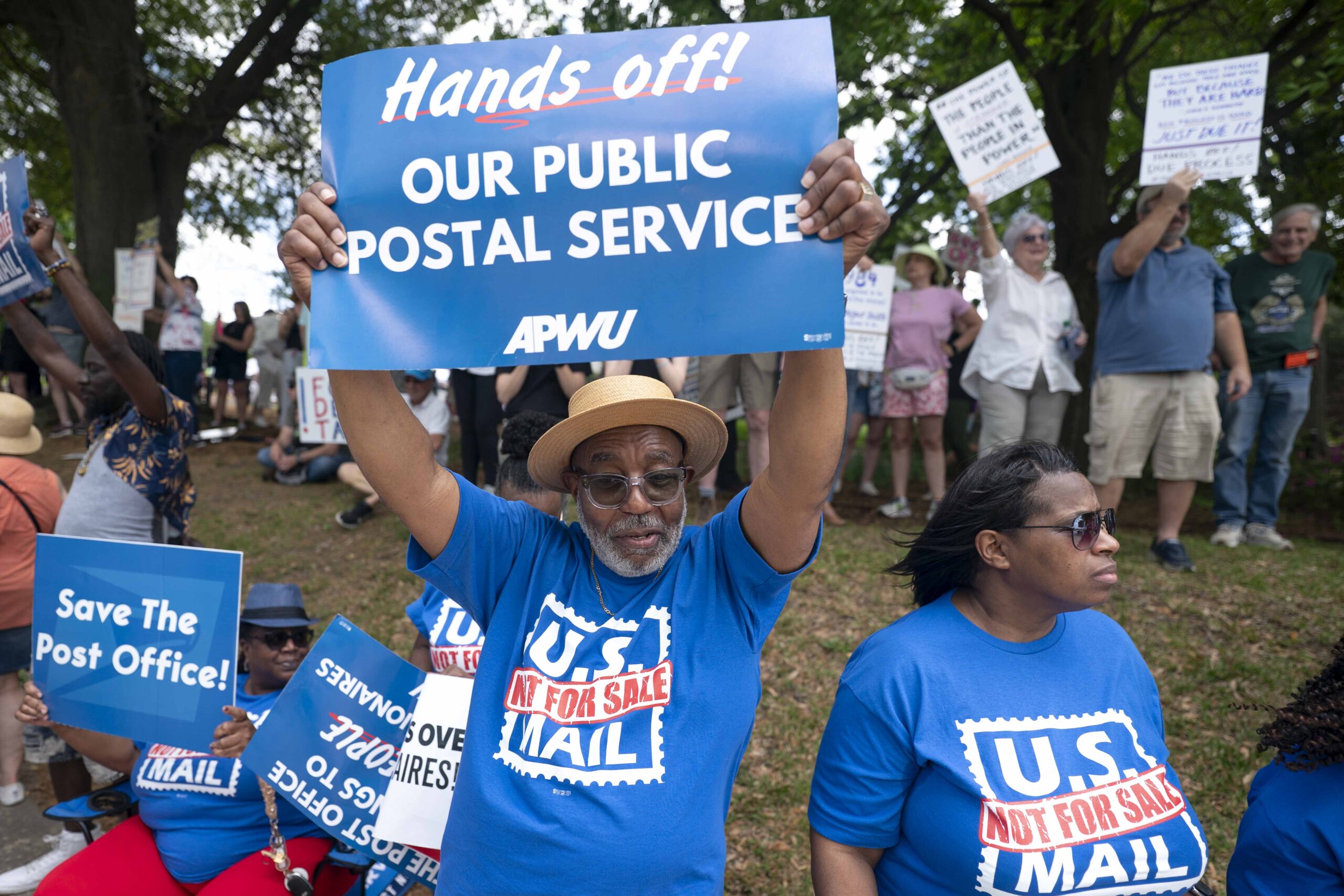Whatever else Donald Trump intends with his assault on the federal workforce, labor unions and the National Labor Relations Board, one potential effect is clear: a devastating blow to Black Americans who for decades have used public-sector jobs to move up from subsistence living and toward the middle class.
“Federal employment has been a pathway to the middle class for African American workers and their families since Reconstruction, including postal work and other occupations,” explained Danielle Mahones, director of the leadership development program at the University of California, Berkeley, Labor Center. “[Now y]ou’re going to see Black workers lose their federal jobs.”
Blacks are the only racial or ethnic group to be “overrepresented” in government jobs. Data analysis by the Pew Research Foundation shows that while Black people make up 12.8% of the nation’s population, they account for 18.6% of the federal workforce.
Deep government cuts will affect California’s 150,000 federal workers, of which Black employees comprise more than 10%.
At the U.S. Postal Service, Black workers comprised 30% of the total workforce in fiscal year 2022. Although the U.S. Government Accountability Office found that African Americans are still underrepresented in executive positions within the postal service, the overall numbers reflect a robust history of Blacks seeking out USPS jobs to move their lives forward.
California has the second-largest population of federal workers outside the Washington, D.C., area. Deep federal job cuts will affect the state’s roughly 150,000 workers, and Black employees make up more than 10% of that total.
Historically, Black workers have used federal positions, many of them union represented, as “pathways to homeownership, higher education for their children and retirement savings — opportunities that were not widely available to previous generations,” said Andrea Slater, director of the Center for the Advancement of Racial Equity at Work at the University of California, Los Angeles, Labor Center.
Those opportunities didn’t insulate Black families from the decades-old practices of redlining housing policies, wage theft and other inequities, Slater said, but a government job usually meant dependable employment and some form of pension. “Federal jobs and government contracts have helped build and establish cohesive Black middle-class communities from the Bay Area to San Diego,” Slater added.
* * *
Postal workers nationwide have publicly protested a proposed cut of 10,000 jobs, which they consider a step toward an Elon Musk-led attempt to privatize the postal service. At a Los Angeles rally in March, Brian Renfroe, president of the National Association of Letter Carriers (NALC), told the crowd, “We had an election in November, and some people voted for President Trump, and some people voted for Vice President Harris, some people voted for other candidates. But you know what none of them voted for? To dismantle the Postal Service.”
Still, a sense of unease hangs over the process. Asked for comment this week, a union representative in Northern California, who said the situation had their colleagues worried about losing jobs and civil service careers, refused to be quoted or identified.
Trump’s true motives for clear-cutting federal jobs and going after the unions aren’t known, but his animus toward union labor is no secret. During his first term, the president’s policymakers acted to weaken or abandon regulations that protected workers’ pay and safety, and Trump directed particular force against federal workers, more than a third of whom are covered by union contracts.
A March press release from the White House claimed that “certain federal unions have declared war on President Trump’s agenda.”
Many workers and their unions were caught flat-footed by the scale and intensity of Trump 2.0’s effort to decimate their ranks. “Nobody was ready for this,” UC Berkeley’s Mahones said. “This is part of a long-term project to eliminate the labor movement and unions. What is new, though, is the acceleration — doing something so massive, so quickly and chaotically, with no regard to the law nor humanity.”
Trump signed an order in March directing 18 departments to terminate contracts it had already signed with unions representing federal workers, and to shutter the process through which employees could file job-related grievances. Trump cited a 1978 law that makes exceptions from collective bargaining for departments that have national security missions.
The American Federation of Government Employees, which represents 820,000 federal and D.C. government workers, said Trump has abused that narrow cutout in the law to go after multiple departments that are heavily unionized — and an accompanying fact sheet distributed by the White House all but confirmed that. The release claimed that “certain federal unions have declared war on President Trump’s agenda,” adding that Trump “refuses to let union obstruction interfere with his efforts to protect Americans and our national interests.”
The AFGE and several other unions filed suit in federal district court in Northern California seeking a temporary restraining order to prevent Trump’s mandate from taking effect. Caught in the middle, meanwhile, are hundreds of thousands of federal employees whose jobs are on the line, including Black workers who may have spent their entire careers in a single area of public-sector service.
“The specific requirements of government sector positions will likely require Black displaced workers to acquire new job skills — and ageism and racism continue to influence hiring practices, even in California,” Slater said. It is an unknown, deeply worrying road ahead.
Copyright 2025 Capital & Main


 Latest NewsFebruary 3, 2026
Latest NewsFebruary 3, 2026
 Featured VideoFebruary 4, 2026
Featured VideoFebruary 4, 2026
 The SlickFebruary 2, 2026
The SlickFebruary 2, 2026
 Column - State of InequalityFebruary 5, 2026
Column - State of InequalityFebruary 5, 2026
 Column - California UncoveredFebruary 6, 2026
Column - California UncoveredFebruary 6, 2026
 The SlickFebruary 10, 2026
The SlickFebruary 10, 2026
 Latest NewsFebruary 12, 2026
Latest NewsFebruary 12, 2026
 Latest NewsFebruary 10, 2026
Latest NewsFebruary 10, 2026

